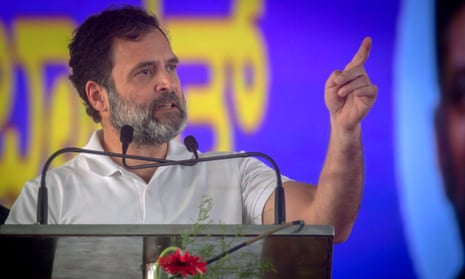The Indian opposition leader Rahul Gandhi has been dealt a blow after a court rejected his plea for a stay on his recent defamation conviction, meaning he could face jail and will lose his parliamentary seat as he appeals against the guilty verdict.
On Thursday, a judge in Surat district court, in India’s western state of Gujarat, rejected his petition seeking a stay of conviction.
The rejection of the plea means Gandhi, former leader of the Congress party and the most recognisable face of India’s political opposition, is disqualified from office and there will now be a byelection in his Kerala constituency.
Gandhi’s lawyers said they would challenge the ruling in a higher court. “We are going to challenge the decision in Gujarat high court tomorrow. We have full faith that the judiciary will uphold justice and save the democracy,” said Naishadh Desai.
In March, Gandhi was convicted of defamation by a court in Gujarat over a 2019 speech made on the campaign trail in which he linked the prime minister, Narendra Modi, with two high-profile criminals, commenting: “Why is it that all thieves have Modi as a common name?”
Purnesh Modi, a legislator in Modi’s home state of Gujarat, subsequently filed a case in the courts alleging that all those named Modi in the country had been offended and defamed by Gandhi’s comment.
The case had stagnated in the courts for almost two years, but earlier this year it was resumed and Gandhi was convicted of defamation in March. He was given the maximum possible sentence, a two-year jail term, which the judge said was due to Gandhi’s “status as a parliamentarian” which made his comments more public and therefore more serious.
It was also the minimum jail sentence needed in order to expel Gandhi from parliament, which happened less than 24 hours after his conviction. If his sentence is upheld, it could see him banned from holding political office for six years.
Gandhi was granted 30 days bail after the ruling. He immediately filed an appeal, calling the sentence “harsh and excessive”, arguing that the case was “politically motivated” and that a “cloak of defamation” had been used as a means to get him expelled from parliament.
Gandhi’s lawyers have also argued that the 130 million people called Modi in India are not one collective group that can be defamed and that the sentence was based on “conjecture not evidence”.
Speaking on Thursday as he rejected Gandhi’s plea, the judge declared that Gandhi’s “derogatory” remarks had evidently caused “pain and agony” to Purnesh Modi and that Gandhi “should have been more careful with his words which would have large impact on the mind of people”.
The refusal by the courts to give Gandhi relief in the case could signal that he faces an uphill battle to get the verdict overturned through an appeal. Many in the Congress party expect the fight to go all the way up to the supreme court.
Opposition figures and critics have said the defamation case against Gandhi is being used as part of an attack on opposition parties by the ruling Bharatiya Janata party (BJP) and symptomatic of an increasingly politicised judiciary.
Many pointed out that the defamation case against Gandhi only began to gather pace this year, just as he was drawing public attention to Prime Minister Modi’s links to the Indian billionaire industrialist Gautam Adani, whose company was recently accused of committing the “largest corporate con in history”. The company has issued a lengthy rebuttal of the allegations.
While out on bail, Gandhi has continued to be politically vocal and this week has been out on the campaign trail in Karnataka, where Congress is fighting to topple the BJP in the state elections next month. “The BJP think I can be intimidated with disqualification but I am not scared,” Gandhi told a rally this week.
